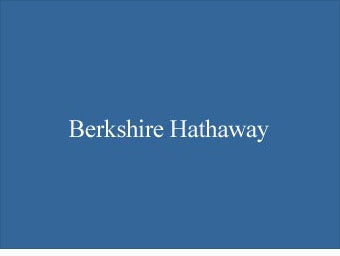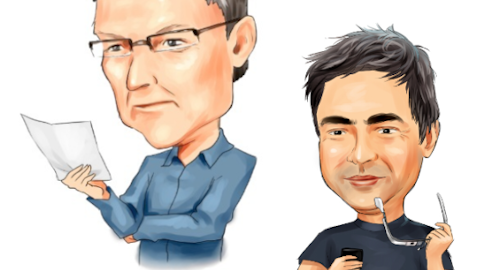What’s the world’s largest company? The answer may not be as cut-and-dried as it seems. Let’s untie a strange, tangled knot right now.
OK, so you’ve seen the epic market-cap duel between Apple Inc. (NASDAQ:AAPL) and Exxon Mobil Corporation (NYSE:XOM). The Dow Jones Industrial Average has risen 19% over the last year, leaving both stocks in the dust. But Exxon managed to eke out a 5% positive change, while Apple’s market cap took a 31% haircut.
Exxon’s market cap has largely ranged between $300 billion and $500 billion for the past nine years, while Apple is a relative latecomer to the $300 billion club. Apple stock crossed that benchmark level on the first trading day of 2011.
So the oil giant is on top right now with a $410 billion market cap. Cupertino topped $600 billion last year but has fallen back to just $390 billion today, losing the crown back to Exxon.

XOM Market Cap data by YCharts.
But what about Berkshire Hathaway Inc. (NYSE:BRK.B), then? Run over to Google Finance and you’ll find Berkshire’s “A” shares listed at a $284 billion market cap, while “B” shares get a $283 billion price tag.
Doesn’t that add up to $567 billion, far surpassing both Exxon and Apple?
Not so fast, my friend. It’s time to double-check our data. Take a trip down to Yahoo! Finance instead, and you’ll find Berkshire “A” listed at $284 billion, while “B” shares get a minuscule $189 million market cap. Add all of it up, and “B” shares become a mere rounding error next to their “A”-class cousins.
What’s going on here?
Yahoo seems to lump “A” and “B” share counts into one big pile, listing both classes as 1.65 million shares outstanding. Multiply that collection by the astronomical $172,500 value of “A”-class shares, and you indeed arrive at $284 billion. Using the far smaller $115 price of class “B” shares results in the much smaller $189 million destination.
Confusion still abounds. Google Finance prefers listing each share count separately, with 1.65 million class “A” stubs and 2.47 billion “B” shares outstanding. Multiply these counts by their respective share prices, and you land at the $284 billion valuation.
What’s going on here? Let’s dive into Berkshire Hathaway Inc. (NYSE:BRK-B)’s SEC filings instead. Berkshire Hathaway’s latest 10-Q filing is as close to the source as we’ll ever get. Yes, there’s only one: Berkshire may trade in two stock classes and operate under dozens of brand names, but it still reports results as a single entity.
And sure enough, here are all the clues we need. Berkshire Hathaway Inc. (NYSE:BRK.B) reports its share counts by class, but it also provides a weighted total figure (on page 19 of the 10-Q, if you’re following along at home). There were 892,000 class “A” shares on the market as of March 31, plus 1.13 billion class “B” tickets. These add up to 1.64 billion class “A” equivalents, counting 1,500 “B” shares as equal to one class “A” certificate. So that’s where Yahoo got its lump-sum share count to arrive at a total $284 billion valuation.
Multiply that weighted total by 1,500 and you get the 2.47 billion figure that Google uses for its Berkshire “B” valuation. So neither one of these popular information services goes to the trouble of calculating the value of each Berkshire stock class separately. Adding the two stocks up is clearly incorrect math: The market caps shown are supposed to represent the whole company — not separate stock classes.
Some assembly required
Doing the sum-of-the-parts math, class “A” shares account for $154 billion of Berkshire Hathaway Inc. (NYSE:BRK.B)’s market cap, and class “B” accounts for the remaining $130 billion. Keeping in mind how Berkshire’s market value should be calculated, the only incorrect value here would be the trivial $189 million price tag that Yahoo! reports for class “B” shares. Google went the extra mile and multiplied it by 1,500 to arrive at the correct value.
So there you have it: Apple and Exxon can continue their game of thrones, far above Warren Buffett’s $284 billion conglomerate. Berkshire Hathaway is most certainly not the world’s most valuable company today.
Your favorite sources of stock information may not always get the math right. When you run into strange numbers, SEC filings and some calculator skills will set the record straight.
The article Does Berkshire Have the World’s Biggest Market Cap? originally appeared on Fool.com and is written by Anders Bylund.
Fool contributor Anders Bylund holds no position in any company mentioned. Check out Anders’ bio and holdings or follow him on Twitter and Google+. The Motley Fool owns shares of Apple and Berkshire Hathaway. Motley Fool newsletter services have recommended buying shares of Berkshire Hathaway and Apple, and have also recommended writing puts on Berkshire Hathaway while creating a bull call spread position in Apple. The Motley Fool has a disclosure policy. We Fools may not all hold the same opinions, but we all believe that considering a diverse range of insights makes us better investors.
Copyright © 1995 – 2013 The Motley Fool, LLC. All rights reserved. The Motley Fool has a disclosure policy.





